Video recordings
In cases where access is restricted to people with a TUM ID, we have only limited permission to publish the material. For this reason, we kindly ask you to refrain from individual requests to make certain recordings available to everyone.
The Department of the Environment is not responsible for the content of the lectures. The opinions of the lecturers do not represent those of the Department of the Environment.
WINTER SEMESTER 23/24
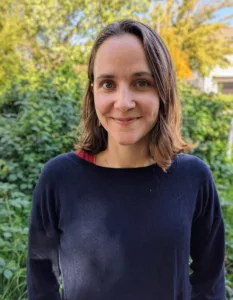 In this lecture we will cover how urban spaces can be analyzed through a feminist lense. While this lecture includes some bits of theory, it will also feature the perspectives on cities of the research participants Julia worked with in the past. What makes a city liveable for them? How do they use the space?
In this lecture we will cover how urban spaces can be analyzed through a feminist lense. While this lecture includes some bits of theory, it will also feature the perspectives on cities of the research participants Julia worked with in the past. What makes a city liveable for them? How do they use the space?
Julia Schinnenburg is a Human Geographer interested in all things cities: Politics, infrastructure and most importantly their citizens’ daily lives. In the past she studied how urban youth can be better included in urban planning processes. For her latest research project she looked at how infrastructure affects women in their work. Through her work she hopes to contribute to a more accurate urban theory, that represents the experiences of all people that are present in urban spaces. Finally, we will take a look at applied feminist urban theory in city planning.
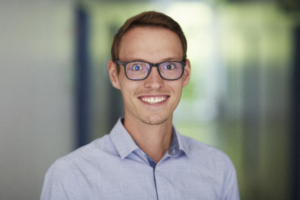

- Bidirectional charging in general and its role as an enabler for e-mobility in the energy system
- Use cases and the assessment of profitability and CO2 emissions of smart and bidirectional charging from a user perspective
- Challenges and opportunities of the technology in urban region.
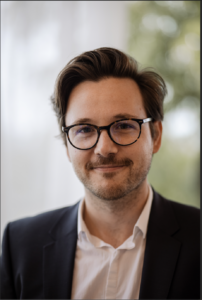

The presentation investigates the crucial part that mobility hubs might play in transforming urban transportation. In order to improve connection, lessen congestion, and accelerate the development of smarter, greener cities, we explore the integration of diverse transport modes, with a special emphasis on micromobility. Join us on a journey into the transformative potential of mobility hubs and their vital role in the urban mobility landscape.
Jonathan Gerz is a researcher with primary focus centers on the seamless integration of mobility and energy technologies to enhance urban connectivity, all while minimizing environmental impact. Possessing a background in engineering, his ultimate goal is to harness engineering principles to create more efficient and sustainable urban systems, thereby improving the quality of life in cities worldwide.
Lecture Recording
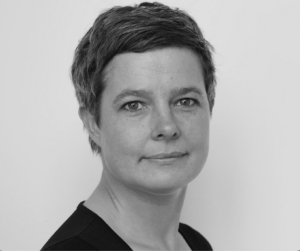

“We do not lack technologies or knowledge for sustainable urban development. We lack speed of implementation”. The lecture outlines transformation paths in various fields of action of urban development, such as housing and mobility, and shows how accelerated implementation can be achieved.
Anja Bierwirth is head of the research unit Urban Transitions in the research division Energy-, Transport- and Climate Policy at the Wuppertal Institute for Climate, Environment and Energy. She studied architecture in Bremen and Cologne and completed her master studies on environmental sciences at the FernUni Hagen. She worked as an architect and in the field of environmental education. Since 2008 she works at the Wuppertal Institute in the fields of local energy and climate action policy, energy efficiency and sufficiency in buildings and sustainable urban development.
Prof. Dr. Harald Lesch ist Professor für theoretische Astrophysik an der Ludwig-Maximilians-Universität München und einer der bekanntesten Naturwissenschaftler Deutschlands. Er vermittelt seit vielen Jahren der breiten Öffentlichkeit spannendes naturwissenschaftliches Wissen. Er hat zahlreiche Bücher veröffentlicht, in denen er sich neben vielen weiteren Themen intensiv mit unserer Welt von morgen auseinandersetzt. Im ZDF moderiert er unter anderem die beliebte Sendung „Leschs Kosmos“.
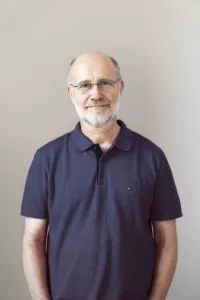

Prof. Dr. Christian Holler ist Professor für Ingenieurmathematik an der Fakultät für angewandte Naturwissenschaften und Mechatronik, Hochschule München. Zuvor hat er in experimenteller Astrophysik an der Universität Cambridge promoviert und später zu diesen Themen in Oxford geforscht. Seit einigen Jahren beschäftigt er sich intensiv mit erneuerbaren Energien und der öffentlichen Diskussion darüber. Seit 2021 ist er zudem Innovationsprofessor für Lehre, um den interdisziplinären Schwerpunkt Nachhaltigkeit weiter auszubauen und neue Lehrangebote zu schaffen.
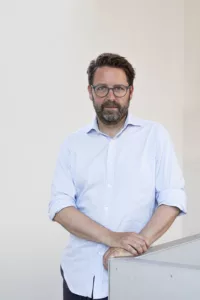

Lecture Recording
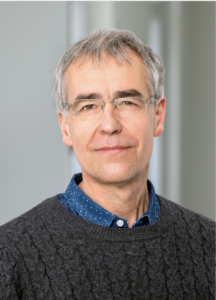

Cities are social, cultural, and economic hubs of humankind. In the 21st century, the proportion of humans living in urban areas is expected to surpass 70 % globally. At the same time, urban areas contribute to global warming with 80 % of all carbon dioxide emissions, they cause the overuse and degradation of natural resources and environmental quality in urban areas can be low. Urban nature is increasingly seen as a solution to these problems. Can it really deliver and how should urban areas be transformed into green cities of the future to become healthy places for people and the planet?
The talk will give insights into recent research of the Centre for Urban Nature and Climate Adaptation at TUM, our Urban Forest Research Group, and the newly established Research Training Group “Urban Green Infrastructure – Training Next Generation Professionals for Integrated Urban Planning Research” to address these questions.
Prof. Dr. Stephan Pauleit is a professor of Strategic Landscape Planning and Management at TUM. Urban ecology, the planning and governance of green infrastructure and nature-based solutions, adaptation strategies to climate change in the urban environment, urban forestry, and trees are his main areas of research.
At present, he is the director of the “Centre for Urban Ecology and Climate Adaptation” at the Technical University of Munich. The Centre has given new insights into integrated strategies for climate change mitigation and adaptation.
Lecture Recording
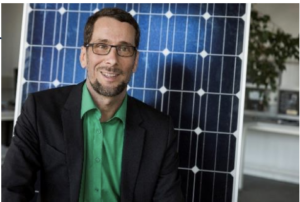

Die Klimakrise ist die größte Bedrohung für unsere Welt, wie wir sie kennen. Wollen wir die Lebensgrund- lagen unserer Kinder bewahren, brauchen wir schon in einer halben Generation eine Energieversorgung ausschließlich auf Basis erneuerbarer Energien. Die Wissenschaft und die Industrie haben für uns die Lösungen entwickelt. Handeln müssen wir alle gemeinsam.
Und wollen wir das Pariser Klimaschutzabkommen mit dem maximal +1,5oC-Ziel noch einhal- ten und die schlimmsten Folgen der Klimakatstrophe vermeiden, brauchen wir in Deutsch- land bereits im Jahr 2035 eine klimaneutrale Energieversorgung. Reicht dazu die Energie von Sonne und Wind aus? Sind Elektroautos wirklich umweltfreundlich? Was bringt das Wärmeplanungs- und das Gebäude-Energie-Gesetz? Und die viel gepriesenen Wärme- pumpen? Ist Wasserstoff wirklich der Heilsbringer – wie politisch behauptet? Was können wir selber tun, unsere Lebensgewohnheiten – nicht nur bei der Energienutzung – zu ändern, auch wenn es nicht leichtfällt? Das sind die Eingangsfragen.
Deutschland versagt beim Klimaschutz: Die Energiekrise hat zu keinen nennenswerten Minderungen der Kohlendioxidemissionen geführt. Sind schon die gesetzlichen Treibhausgas-Reduktionsziele der Bundesregierung deutlich zu matt, so werden sie ja auch Jahr für Jahr nicht erreicht – dabei hält die Bundesregierung ihre eigenen Gesetze nicht ein! Auf FDP-Druck hat das Bundeskabinett mit einem „Klimagesetz für Klima- verschmutzer“ (Quaschning) das Aufweichen des Klimaschutz-Gesetz beschlossen – welches aufgrund des seinerzeitigen „Klimaschutz-Urteils“ des Bundesverfassungsgerichts, April 2021, gerade erst verschärft werden musste. Weil der Bundesverkehrsminister im Verkehrssektor nicht wirk- lich Treibhausgase reduzieren will, sollen nun andere Sektoren zusätzlich sparen. Nur wird auch dieser Plan nicht funktionieren, weil künftig alle Sektoren ihre Ziele reißen werden.
Der Anteil erneuerbarer Energien am deutschen Bruttostromverbrauch hat im Jahresdurchschnitt 2022 zwar erfreulicherweise über 46 Prozent erreicht, vier Prozentpunkte mehr als 2021. Was einerseits an günstigem Wetter für Photovoltaik- und Windkraftanlagen lag. Andererseits wurde im Schatten der Energie- krise – insbesondere im Sektor privater Haushalte – durchaus weniger Strom verbraucht. Für einen wirk- samen Klimaschutz muss ein Anteil von 100 % regenerative Energien aber bereits 2035, jedenfalls deutlich (!) vor 2040 angestrebt werden. Dazu muss das Ausbautempo erneuerbarer Energien sowohl bei Strom als auch bei Wärme allerdings erheblich gesteigert werden. Das Einhalten des Pariser Klimaschutzabkommens ist mit dem bislang immer noch niedrigen Zubau nicht möglich.
Wie der Einstieg in den Ausstieg aus der Klimakatastrophe dennoch gelingen kann, warum wir dafür eine echte Energierevolution brauchen – und zwar JETZT! – und welche globalen und hiesigen Folgen beim Scheitern drohen, das erläutert einer der weltweit führenden Experten für Regenerative Energien.
Und da wird es wohl viel nachzufragen geben…
Prof. Dr. Ing. habil. Volker Quaschning seit 2004 im Fachbereich Regenerative Energiesysteme der Hochschule für Technik und Wirtschaft (HTW), Berlin, und dessen Sprecher; Studium E-Technik am KIT Karlsruhe, Promotion und Habilitation an der TU Berlin; danach Projektleiter beim Deutschen Zentrum für Luft- und Raum- fahrt; Initiator der Bewegung „Scientists For Future“ (S4F).
Lecture Recording
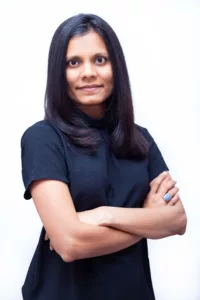

Sand is the unsung hero of our cities. It is used in myriad ways not only to create composite materials such as concrete and glass but also behind the scenes in many industrial processes. However, the scale and pace of extraction is far beyond what can be produced responsibly and is leaving behind massive social-ecological impacts in many parts of the world. What compounds the problem is that sand and gravel are non-renewable resources in human timescales and not every kind of sand is suitable for use in the current industrial system. Join us to explore how we can build our cities and provide for development needs in a sustainable or even regenerative manner.
Kiran Pereira is a PhD Researcher at the Stockholm Resilience Centre, Stockholm University. Her research focuses on risks and opportunities of sand for global sustainability. She is the author of the book Sand Stories: Surprising Truths about the Global Sand Crisis and the Quest for Sustainable Solutions and the Founder of SandStories.org. Her work has previously been featured in the award-winning documentary Sand Wars and media such as The Economist, BBC Radio5, Al Jazeera, Financial Times, ZDF Magazin Royale, CNBC digital among others.
Lecture Recording
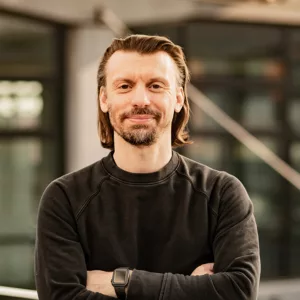

The awareness for new work approaches in organizations has also an impact on our educational institutions and their spatial structures. To foster agile, interdisciplinary, and problem-seeking skills among future professionals, there is a need for spaces that are open and adaptable, yet convey the identity and values of the institution and environment. These spaces empower students to explore and engage; they support them in applying knowledge collaboratively and creating responsible solutions. The physical space becomes a guide and motivator, a medium for innovation. With the technological advancements for hybrid realities, for prototyping and testing, we may have now the chance, to turn visions on the future of work from the 1960s into reality. And shape our urban futures.
Christos Chantzaras is architect and researcher. He has been working at the interface of organizational development, innovation processes, and physical spaces for over 15 years. After international projects in Europe and Asia, he is researching and teaching at the Technical University of Munich since 2017. He investigates future competencies, new methods of innovation management and the requirements for future of work, for future of education and for sustainable urban spaces. Since 2023, he has been member of the “Community of Practice” for Learning Architectures at the Stifterverbandes für die Deutsche Wissenschaft. In parallel, he has installed together with Tobias Förtsch the TUM Venture Lab for the Built Environment, where he acts as managing director to leverage the innovation potential residing in the research and studies of architecture and civil engineering.
Lecture Recording
Some slides have been replaced by a black screen for copyright reasons
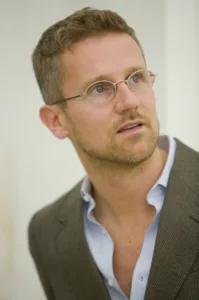

The way we live, work, and play is very different today than it was just a few decades ago, thanks in large part to a network of connectivity that now encompasses most people on the planet. In a similar way, today we are at the beginning of a new technological revolution: the Internet is entering the physical space – the traditional domain of architecture and design – becoming an “Internet of Things” or IoT. As such, it is opening the door to a variety of applications that – in a similar way to what happened with the first wave of the Internet – can encompass many domains: from production to citizen participation, from energy to mobility to public hygiene, all of which requiring new insights due to the changes brought forth by the ongoing COVID-19 pandemic. The contribution from Prof. Carlo Ratti will address these issues from a critical point of view through projects by the Senseable City Laboratory, a research initiative at the Massachusetts Institute of Technology, and the design office Carlo Ratti Associati.
An architect and engineer by training, Professor Carlo Ratti teaches at the Massachusetts Institute of Technology (MIT), where he directs the Senseable City Lab, and is a founding partner of the international design and innovation office Carlo Ratti Associati. He graduated from the Politecnico di Torino and the École Nationale des Ponts et Chaussées in Paris, and later earned his MPhil and PhD at the University of Cambridge, UK.
A leading voice in the debate on new technologies’ impact on urban life and design, Carlo has co-authored over 500 publications, including “The City of Tomorrow” (Yale University Press, with Matthew Claudel), and holds several technical patents. His articles and interviews have appeared on international media including The New York Times, The Wall Street Journal, The Washington Post, Financial Times, Scientific American, BBC, Project Syndicate, Corriere della Sera, Il Sole 24 Ore, Domus. His work has been exhibited worldwide at venues such as the Venice Biennale, the Design Museum Barcelona, the Science Museum in London, MAXXI in Rome, and MoMA in New York City.
Carlo has been featured in Esquire Magazine’s ‘Best & Brightest’ list and in Thames & Hudson’s selection of ‘60 innovators’ shaping our creative future. Blueprint Magazine included him as one of the ‘25 People Who Will Change the World of Design’, Forbes listed him as one of the ‘Names You Need To Know’ and Fast Company named him as one of the ’50 Most Influential Designers in America’. He was also featured in Wired Magazine’s ‘Smart List: 50 people who will change the world’. Three of his projects – the Digital Water Pavilion, the Copenhagen Wheel and Scribit – have been included by TIME Magazine in the list of the ‘Best Inventions of the Year’.
Carlo has been a presenter at TED (in 2011 and 2015), program director at the Strelka Institute for Media, Architecture and Design in Moscow, curator of the BMW Guggenheim Pavilion in Berlin, and was named Inaugural Innovator in Residence by the Queensland Government. He was the curator of the Future Food District pavilion for the 2015 World Expo in Milan and chief curator of the “Eyes of the City” section at the 2019 UABB Biennale of Architecture and Urbanism of Shenzhen. He is currently serving as co-chair of the World Economic Forum’s Global Future Council on Cities and Urbanization.
Lecture Recording
Summer semester 23
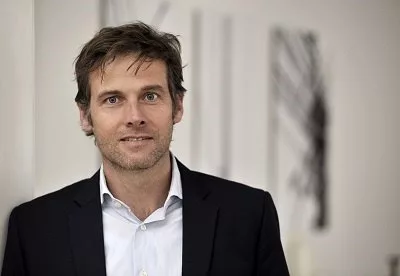



Youth participation at international climate negotiations under the United Nations Framework Convention on Climate Change (UNFCCC) has steadily grown. YOUNGO, the official children and youth constituency to the UNFCCC, has done organized efforts to push for more ambitious climate policy since 2009. In this lecture active members of YOUNGO will talk about YOUNGO as a constituency, achievements as well as challenges and how to lobby for change.
1. Ben Santhouse-James : Energy Contact Point at YOUNGO, the UNFCCC Youth Constituency, and works with a broad range of non-profits and youth climate organisations to promote systems thinking and interdisciplinary approaches to solving the climate crisis. He has been involved with YOUNGO for three years, previously serving on the Global Coordination Team and leading the COP27 and COP26 Energy and Sustainable Consumption & Production Global Youth Statements respectively. He holds an MSc in Energy Systems from the University of Oxford, where his research focused on carbon removals, and a BSc in Earth Science (Geophysics) from Imperial College London. In his day job, Ben works as a Sustainability Consultant at McKinsey & Company across sustainable finance, carbon management, and climate tech, and has previous work experience in environmental policy and growth capital investing across energy transition and circular economy assets.
2. Clara Von Glasow: a German law graduate who has been an active member of YOUNGO since 2017. She served as the YOUNGO Global Focal Point in 2018 and since then has joined YOUNGO´s Global Coordination Team. Within YOUNGO she focusses on facilitating processes within the constituency and Capacity-Building for youth participation at UNFCCC conferences. In 2019 she sailed across the Atlantic with a group of youth activists to attend a climate conference in Latin America. Since then she has been organizing participation of Latin American youth at international climate conferences through scholarship programs. (last two sentences can be deleted if necessary)
3. Saher Rashid Baig: Youth advocate for Climate Justice, Human Rights and Child Rights Policy | Current Contact Point of the Cities Working Group and Former Contact Point of the Nationally Determined Contributions (NDC) and Human Rights Working Group – YOUNGO; Official Children and Youth Constituency to the United Nations Framework Convention on Climate Change (UNFCCC) | Stockholm+50 Youth Task Force member on behalf of Sustainable Communities (SDG11) Constituency.
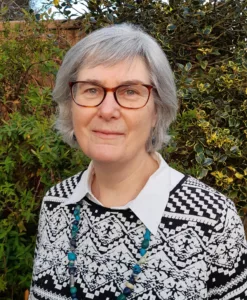

Dr. Teresa Belton studied Art History at the University of East Anglia 1971-1974, during which time she was a founder member of the UEA Eco-action Group. Later, she worked in a theatre, in community learning development, and undertook doctoral work into the influence of television on children’s story-making, leading to work as an educational researcher. She is the author of Happier People Healthier Planet: How putting wellbeing first would help sustain life on Earth
Lecture Recording (In 0:00-3:51, the first slides were not shown, please use the slides in Lecture Material)
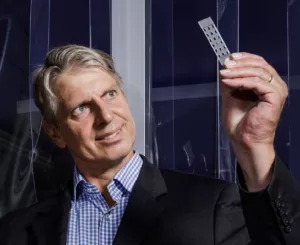

In our workshop, we use simple calculations to get to the bottom of the following questions:
What is the difference between terawatts and terawatt-hours?
How much energy do I need? How much can I take out of the earth?
How can I estimate my carbon footprint?
What measures can I take, what measures must society and business take to ensure the freedom of future generations?
Lecture Recording
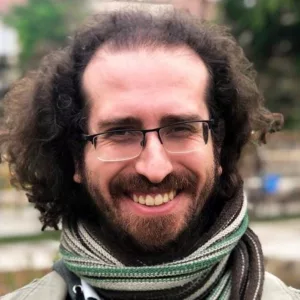

Domenico Vito, PhD Bio-engineer, worked as Researcher at the Metabolism of Cities Living Lab San Diego State University, observer of Conferences of the Parties since 2015 , Member of the Italian Society of Climate Sciences (SISC), Youtuber HubZine Italia for dissemination on international negotiations and organizer of the Climate Change Symposiums and Climate Social Forum. Since September 2021 he is co-coordinator and member of the scientific committee of the International Conference One Health Conference.
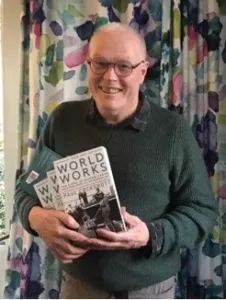

Paul Cockshott is a Computer Scientist and Marxist Economist. His CS research has covered special purpose machines, 3D TV studios, programming languages and video compression. In Economics he has done work on value theory, the foundations of historical materialism and the operation of planned economy.
Now retired from paid work he writes and lectures online. He previously worked in the Computer Industry and as an academic at various Scottish Universities. His two most recent books were How the World Works and Economic Planning in an Age of Climate Crisis.
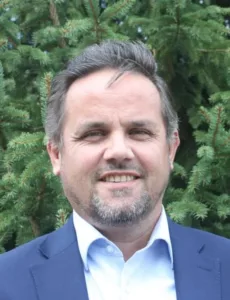

Miroslav Polzer is the founder and executive director at IAAI GloCha, a UN accredited social enterprise based in Klagenfurt/Austria which aims to get everyone, everywhere engaged in climate action with culture, technology and organizational innovation (including resource mobilization innovation). Miroslav Polzer is founder of the #DigitalArt4Climate program which engages global youth and global creative community in climate action with an art competition, blockchain technology (NFTs) based resource mobilization and related edutainment programs. Miroslav Polzer is also strategic director of the Climate Chain Coalition, which is the world’s leading network of organizations that work in the field of harnessing blockchain technology for enhanced multistakeholder climate action.
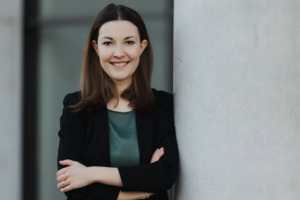

Clara Kühner studied psychology at LMU Munich (B. Sc.) and Bamberg University (M. Sc.). During this time, she held internships in various organizations in the fields of personal development and personnel selection. In 2022, she received her Ph.D. from the University of Leipzig, focusing on the connections between work and employee well-being.
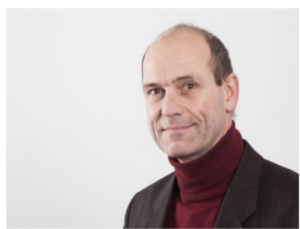

Prof. Balensiefen studied law and philosophy at the university of Tübingen where he received his doctoral grade too. Since more than two decades he practices as a Professor of Environmental, Building and Planning Law at the University of Applied Sciences in Biberach. There he established several years ago a climate protection management and a climate protection concept for the University in the program of the German Federal Ministry for the Environment “National Climate Initiative” (https://www.hochschule-biberach.de/campusklimaneutral).
Considering the global anthropogenic climate change with its man-made consequences, questions of motivation and means for taking actions arise:
Are we taking actions for reaching certain goals or are we acting to ease our personal conscience, to feel good or at least better? And: Does it mean that acting together requires that members of acting groups pursue the same purposes?
Depending on the positioning, the instruments of taking actions differ widely: should we move only within the frame of legal possibilities, or is there a concept of justice which legitimates even illegal behaviour? Or does the end, in the sense of preventing the world conflagration, justifies the means? And: What is the role of the scientific community in this? The operating system of science is, first, gaining and generating correct knowledge. Therefore, the theory-practice problem is inherent in it. But already in the Middle Ages the task of the professional faculties (jurisprudence, medicine and theology) was the practical implementation of knowledge, and modern professional faculties like engineering sciences, as well, are unthinkable without the perspectives of practical implementation. On the other hand, are there limits for the duty, or at least the allowance, to take actions in line with our scientifically based knowledge? In the normative scale, there is a broad range going from legal correctness over stressing the boundaries of legal admissibility up to civil disobedience or even violence towards objects or against people.
There is no panacea for all of these problems, but there is the possibility for critical differentiation and for drawing up crash barriers, which should help to prevent mispositioning that neither leads to achieve the overall goals nor to personal self- fulfilment.
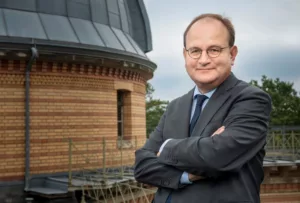

In the EU, we have committed to climate neutrality and net negative after 2050. With “Fit for 55”, probably the most important and comprehensive climate protection program has been launched. But there is no time for “regulatory fatigue”; the ESABCC recently launched the next phase of climate policy with its proposal on a 2040 climate target and GHG budget 2030-50. The question is whether the EU climate architecture is fit for net-zero. Climate neutrality means that residual emissions have to be balanced by removals. For this we need a new governance system (esp. due to non-permanence of many CDR options). The 21st century will have planetary waste management as a core task. The EU needs new institutions to cope with this challenge, especially a European Carbon Central Bank.
Ottmar Edenhofer is director and chief economist at the Potsdam Institute for Climate Impact Research (PIK) and director of the Mercator Research Institute on Global Commons and Climate Change (MCC). Furthermore, he is professor at the Technical University of Berlin and considered one of the world’s leading experts on the economics of climate change. His memberships include, among others, the German Academy of Science and Engineering acatech and the German Academy of Sciences Leopoldina. From 2008 to 2015, Ottmar Edenhofer served as Co-Chair of Working Group III of the Intergovernmental Panel on Climate Change (IPCC). Edenhofer’s scientific expertise is sought by policy and international organizations likewise. He has published articles in a number of peer-reviewed journals and authored a number of books. The fourth year in a row, Ottmar Edenhofer belongs to the 1% of the most cited scientists worldwide in the category “interdisciplinary science” according to the Web of Science citation index.
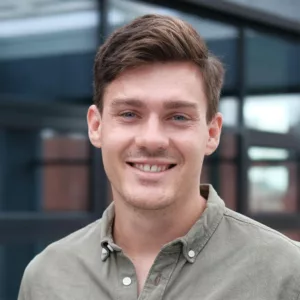

Niclas-Alexander Mauß is Co-Founder of CIRCULAR REPUBLIC at UnternehmerTUM, Europe’s largest center for start-ups and innovation. Over 10 years, he helped shape the transformation of Lorenz, a SME technology manufacturer, into a multiple award-winning pioneer of Circular Economy, including the German Innovation Award for Climate and Environment. He then initiated the CirculaTUM research network in 2020 as part of his doctorate at TUM and expanded it to become the largest of its kind in Germany, while at the same time managing an incubator at UnternehmerTUM. With CIRCULAR REPUBLIC, he connects UnternehmerTUM ecosystem together with large companies, SMEs and startups on the industrial and societal transformation to a Circular Economy.
With around 50 % of GHG emissions and 90 % of biodiversity loss linked to the extraction and processing of natural resources, the transformation of industry and society to a circular economy is key for the protection of climate and ecosystems. But even more than this, circularity is also a major factor for supply security and technological souvereignity in Europe and beyond. In his talk, Niclas-Alexander Mauss will give an introduction to the concept of a circular economy, show up action fields and potentials including examples from industry and startups, and explain in a deep diving case-study, how companies can transform themselves to circularity.
WINTER semester 23
- 22.11.22 #04 Dr. Martin Kueppers – Decarbonization of the industry sector: Required technologies and supporting policies
- 06.12.22 #06 Louis Uzor (Climeworks) – Carbon Capture & Storage
- 13.12.22 #07 Simon Pichlmaier & Valerie Ziemsky- How to get rid of emissions in transport and why this didn’t happen in the past
- 10.01.23 #09 Dr.-Ing. Michael Krause – Concepts and strategies for decarbonization of the building sector
- 17.01.23 #10 PhD. Laura Carotti – Sustainable use of resources in vertical farms
- 24.01.23 #11 Prof. Kirsi Niinimäki – The environmental price of fast fashion
- 31.01.23 #12 Dr. Mark Andor – The German 9-Euro-Ticket-Experiment – an Evaluation
Summer semester 22
- 12.07.22 Prof. Susan Clayton – Preparing for climate change: The role of psychology
- 05.07.22 Richard Wouters – Metals for a Green and Digital Europe
- 28.06.22 Prof. Dr. Steve Cohen – A Realistic Transition Environmental Sustainability
- 14.06.22 Marissa Santikarn and Rachel Mok – Carbon Pricing and Climate Finance in a Net Zero World
- 31.05.22 Ph.D. Rose-Ann Smith – Understanding and Navigating Climate Injustices in Small Island Developing States: The case of St. Vincent and the Grenadines (SVG)
- 24.05.22 Prof. Dr. Susanne Nothhafft – Protecting climate refugees. High time for a human-rights-based regime
- 17.05.22 Hanna Wang-Helmreich – Key players and the role of other actors and stakeholders in global climate governance: Who will save the earth?
- 10.05.22 Dr.-Ing. Christoph Pellinger & Dr.-Ing. Anika Neitz-Regett – Insights into the machinery room of the energy transition – science at the interface between politics and business
Winter semester 21
- 18.01.22 Modesta Nnedinso Abugu – Global Developments in Agriculture and Agricultural Biotechnology
- 13.01.22 Christian Maier – EWG: Turnaround in the heating sector
- 11.01.22 Dr. Elisabeth Dütschke – No savior in sight? Acceptance for changing socio-technical systems
- 21.12.21 Dr. Kepa Iturralde – Automation and Robotics for Refurbishing Existing Building Stock and Reaching Zero Energy Consumption in Buildings
- 14.12.21 Dr. Stefan Schäfer – Climate Geoengineering: Past, Present, and Future?
- 02.12.21 Prof. Dr. Stefan Rahmstorf – Kipppunkte im Klimasystem (german, requires TUM login)
- 30.11.21 Dr. Moritz Kühnel – Green hydrogen – challenges and opportunities
- 23.11.21 Dr. Philip Schütte – Responsible Cobalt Sourcing and Artisanal Mining – Challenge or Opportunity?
- 16.11.21 Dr. Paul Brockway – Chasing Fool’s Gold? A misplaced faith in energy efficiency to decouple energy use from GDP – recent evidence and implications for 1.5⁰C Paris target
- 09.11.21 Jim-Felix Lobsien – Limits of Human Ignorance
- 02.11.21 Wilhelm Cramer, Antonia Heinemann, Frederik Scholing – Grid Operation – The role of artificial intelligence (AI) in the transformation of the energy system
Summer semester 21 citycentre
- 02.06.21 Friederike Krüger – Climate change in the Artic – an expedition report
- 26.05.21 Dr. Rebecca Zitoun – Where should we start if we do not know where to start from?
- 19.05.21 Patrick Leòn Gross – How to Think with Doughnut Economics – and Put it in Practice in Berlin
- 12.05.21 Matt Muchna – Flood Justice in the United States
- 05.05.21 Anshuman Das – Small farm or big farm: who will feed the world?
- 28.04.21 Jens Benöhr – The Home River Bioblitz: Where Science and Activism Meet for River Conservation
- 21.04.21 Janna Kretschmar – “We protect what we love!” – A small grassroots NGO from South Africa shares their unique approach to environmental education
Summer semester 21 Garching
- 01.06.21 CO2: From Climate Killer to Sustainable Feedstock (Eric Schuler)
- 25.05.21 Sustainability Perspectives for Assessing and Designing Research, Projects and Policies (Alejandro Ceballos (Venezuela) and Jana Funk (Germany))
- 18.05.21 Learning Together – Towards Reciprocal Emancipation (Alejandro Ceballos (Venezuela) and Jana Funk (Germany)) (not publicly available)
- 11.05.21 Decolonization of Development – Insights into the Work from Epatu Konuko (Alejandro MCeballos (Venezuela) and Jana Funk (Germany))
- 04.05.21 Water Governance – A Key to Sustainability (Shahana Bilalova)
- 27.04.21 Forest Biomass Energy – Is it climate friendly and renewable? (Almuth Ernsting)
- 20.04.21 Ocean Energy – Potential and Current Status (Marcus Lehmann)
- Recordings of older semesters (German)

